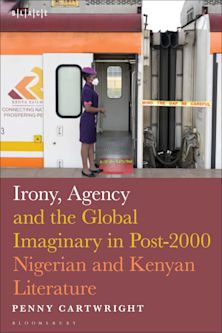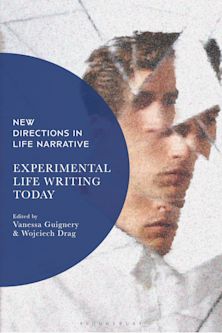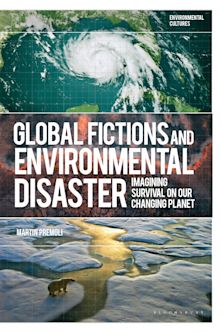- Home
- ACADEMIC
- Literary Studies
- Contemporary Literature
- New International Voices in Ecocriticism
New International Voices in Ecocriticism
Serpil Oppermann (Anthology Editor) , Kyle Bladow (Contributor) , William V. Lombardi (Contributor) , Sylvan Goldberg (Contributor) , Basak Agin Dönmez (Contributor) , Sarah Nolan (Contributor) , Elise J. Mitchell (Contributor) , Guangchen Chen (Contributor) , Anu T. Asokan (Contributor) , Abdulhamit Arvas (Contributor) , Christina Caupert (Contributor) , Elzette Steenkamp (Contributor) , Diana Villanueva Romero (Contributor) , Greta Gaard (Afterword) , Scott Slovic (Foreword)
New International Voices in Ecocriticism
Serpil Oppermann (Anthology Editor) , Kyle Bladow (Contributor) , William V. Lombardi (Contributor) , Sylvan Goldberg (Contributor) , Basak Agin Dönmez (Contributor) , Sarah Nolan (Contributor) , Elise J. Mitchell (Contributor) , Guangchen Chen (Contributor) , Anu T. Asokan (Contributor) , Abdulhamit Arvas (Contributor) , Christina Caupert (Contributor) , Elzette Steenkamp (Contributor) , Diana Villanueva Romero (Contributor) , Greta Gaard (Afterword) , Scott Slovic (Foreword)
For information on how we process your data, read our Privacy Policy
Thank you. We will email you when this book is available to order
You must sign in to add this item to your wishlist. Please sign in or create an account
Description
With twelve original essays that characterize truly international ecocriticisms, New International Voices in Ecocriticism presents a compendium of ecocritical approaches, including ecocritical theory, ecopoetics, ecocritical analyses of literary, cultural, and musical texts (especially those not commonly studied in mainstream ecocriticism), and new critical vistas on human-nonhuman relations, postcolonial subjects, material selves, gender, and queer ecologies. It develops new perspectives on literature, culture, and the environment. The essays, written by contributors from the United States, Canada, Germany, Turkey, Spain, China, India, and South Africa, cover novels, drama, autobiography, music, and poetry, mixing traditional and popular forms. Popular culture and the production and circulation of cultural imaginaries feature prominently in this volume—how people view their world and the manner in which they share their perspectives, including the way these perspectives challenge each other globally and locally. In this sense the book also probes borders, border transgression, and border permeability. By offering diverse ecocritical approaches, the essays affirm the significance and necessity of international perspectives in environmental humanities, and thus offer unique responses to environmental problems and that, in some sense, affect many beginning and established scholars.
Table of Contents
Forewordby Scott Slovic
Acknowledgments
Introduction: New International Voices in Ecocriticism
Serpil Oppermann
Part I. New Ecocritical Trends
Chapter 1. Selves at the Fringes: Expanding Material Ecocriticism
Kyle Bladow
Chapter 2. “Global Subcultural Bohemianism”: Postlocal Ecocriticism and Tim Winton’s Breath
William V. Lombardi
Chapter 3. “What is it about you . . . that so irritates me?”: Northern Exposure’s Sustainable Feeling
Sylvan Goldberg
Chapter 4. Bang Your Head and Save the Planet: Gothic Ecocriticism
Basak Agin Dönmez
Part II. Nature and Human Experience
Chapter 5. Un-Natural Ecopoetics: Natural/Cultural Intersections in Poetic Language and Form
Sarah Nolan
Chapter 6. “There’s No Place like ‘Home’”: Susanna Moodie, Shelter Writing, and Dwelling on the Earth
Elise Mitchell
Chapter 7. Against Ecological Kitsch: Derek Jarman’s Prospect Cottage Project
Guangchen Chen
Chapter 8. Neo-Aranyakas: An Enquiry into Mahasweta Devi’s Forest Fictions
Anu T. Asokan
Chapter 9. Ecoerotic Imaginations in the Early Modernity and Cavendish’s The Convent of Pleasure
Abdulhamit Arvas
Part III. Human-Nonhuman Relations
Chapter 10. What Are We? The Human Animal in Eugene O’Neill’s The Hairy Ape
Christina Caupert
Chapter 11. Familiar Animals: The question of human-animal relationships in Lauren Beukes’s Zoo City
Elzette Steenkamp
Chapter 12. Dismantling “Conceptual Straitjackets” in Peter Dickinson’s Eva
Diana Villanueva Romero
Afterword by Greta Gaard
Contributors
Index
Product details
| Published | 18 Dec 2014 |
|---|---|
| Format | Ebook (Epub & Mobi) |
| Edition | 1st |
| Extent | 228 |
| ISBN | 9781498501484 |
| Imprint | Lexington Books |
| Series | Ecocritical Theory and Practice |
| Publisher | Bloomsbury Publishing |
About the contributors
Reviews
-
With essays from 12 doctoral students, this volume showcases emergent voices and celebrates the current diversity of critical approaches in ecocriticism. Most of the essays examine environmental issues within traditional literary genres, but a few analyze forms of pop culture, such as television sitcoms and heavy metal music. In a useful introduction, Oppermann offers a survey of the global contexts of ecocriticism. The essays themselves appear in three sections. The first, 'New Ecocritical Trends,' proposes a set of theoretical approaches: deconstructive ecocriticism, 'postlocal ecocriticism,' 'affective ecocriticism,' and 'gothic ecocriticism.' The second section explores how ecocriticism has moved beyond a concern with nature: these essays discuss the relationships among environment, culture, identity, and power and examine concepts of the 'un-natural' and the marginalized, place, and displacement. The final section focuses on human and animal relations in contemporary literature. The volume features an impressively transnational group of young scholars . . . The collection offers an interesting set of provocations and offers a glimpse of how ecocriticism might evolve as an increasingly global field of study. Summing Up: Recommended. Graduate students, researchers, faculty.
Choice Reviews
-
Gothic ecocriticism. Eco-eroticism. Postlocalism. Unnatural eco-poetics. New materialisms. Eco-aesthetics… Serpil Oppermann’s farsighted, courageous project is here to show what ecocritical scholarship stands for: not only eliciting new categories, but also enabling new visions and creativities. The international voices speaking from these pages are telling us that the future of ecocriticism is here and now.
Serenella Iovino, Professor of Comparative Literature, University of Turin, Italy
-
A needed spur to a more globalized field, New International Voices in Ecocriticism presents a lucid argument for why the ecocritical future must be geographically and temporally capacious. Combining activism and environmental justice and a focus on materiality with ethical generosity, the essays collected in this book offer a compelling vision of ecocriticism as an interdisciplinary and transformative practice. Serpil Oppermann is to be commended for gathering so many fine, emergent voices in this indispensable forum, and for composing an introduction for the book that serves as a manifesto for work to come.
Jeffrey J. Cohen, George Washington University



































